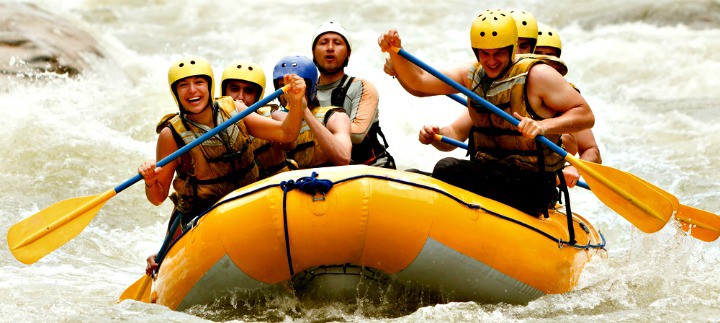Do Your Vacation Plans Include Extreme Sports? Better Pack Extra Insurance

If you’re a thrill-seeker then chances are your idea of a summer vacation is going to involve some sort of extreme sport — whether it’s rock climbing, whitewater rafting or even sliding down a zip line.
But engaging in extreme sports comes with a higher risk of accident. For those who like to live on the edge, it’s all about managing risk. That means having the right insurance before taking that bungee plunge.
“Many travelers want to know if they need additional coverage for adventurous trips,” says Steven Benna, Squaremouth Marketing Specialist. “It depends on what they’ll be doing, but additional coverage is typically only necessary for extreme sports, such as mountaineering or skydiving.”
So what insurance does an adventurer need? Usually something like a hazardous sports rider.
RELATED: Do High School Athletes Need Extra Insurance?
This type of rider is often an option with a travel insurance plan. Coverage typically includes medical and dental expenses, evacuation and repatriation expenses, as well as accidental death and dismemberment (AD&D) benefits. Generally, these are insured by companies that specialize in policies designed to cover higher-risk activities.
Underwriters at these insurance companies are knowledgeable about each type of risk and can customize policies to fit your adventure-seeking needs.
Be prepared though: premiums are a lot more expensive than regular travel insurance. In addition, many carriers offer adventure sports health coverage to U.S. residents only while traveling abroad.

When travel and health insurance fall short
Travel medical insurance is usally a policy for when you are traveling out of the United States. If injured, your health care plan most likely provides very limited coverage outside of an emergency. Some plans provide no coverage at all. Travel medical insurance can protect you in the event of illness or injury and can provide emergency medical treatment and, in many cases, evacuation to the nearest medical facility.
Standard travel insurance will generally cover some casual activities, such as archery or easy hiking. But more rigorous activities, such as zip lines and skydiving, may not be covered as standard.
Health insurance offers some coverage for adventure-seekers traveling outside the U.S., the good news is that many domestic health plans provide coverage for emergencies regardless of whether or not the emergency occurred as a result of participating in an extreme sport or activity. The bad news? Even if your plan does cover out-of-country emergencies, continued medical treatment that is deemed non-emergency will not be covered. Depending on the degree of medical care required after an accident, you may be on the hook for thousands of dollars in medical bills without additional coverage.

It’s always important to read the fine print to see exactly what is not covered by your insurance — no matter what insurance policy you consider purchasing. For instance, a traditional travel policy may cover hiking or scuba diving with specific restrictions on altitude or depth — and provided you’re fully qualified.
Similarly, most travel insurance won’t provide coverage for sporting competitions, even for kids. This information is usually found under the “General Exclusions” section within the policy’s certificate. The same is true of adventure sport insurance. Most will not cover:
- Pre-existing conditions
- Elective, investigational, or experimental treatment or surgeries
- War, military action, terrorism or political insurrection or protest
- Pregnancy-related care
- Venereal diseases
- Immunizations and routine physical exams
In addition, there are some specific high-adrenaline activities that virtually no insurer will cover. These include:
- Professional sports
- Motorsport and racing
- Running with the bulls
- BASE jumping
- Shooting
- Whitewater rafting exceeding Class V difficulty
- Flying aircraft
- Expeditions to inaccessible, remote or previously unexplored places
Extreme sports and life insurance
The risk of injury while participating in extreme sports is one thing, but you also need to consider your insurance needs in the event of death.
Nobody wants to think about dying on a vacation, but for adrenaline junkies, it’s a real possibility. That’s why it’s important to take into consideration how the cost of that adventure impacts life insurance rates. Life insurance rates reflect a buyer’s risk level which is based on the usual criteria — age, gender, and health — in addition to hobbies.
“Customers should make sure their life insurance covers extreme sports and high-risk occupations,” insurance specialist Michael Aziz tells Insurance Business magazine. “If clients do extreme activities, they should be transparent and let the broker know of everything they’re into — and then the broker will determine whether that is considered an extreme activity by the insurance company.
CHECK OUT: What Exactly Does Travel Insurance Cover?
“It is better to give more information than less, so that clients are covered in the unfortunate circumstance that something does happen.”
Research shows that just as the types of equipment for extreme sports cost significantly more than that for casual sports, so are the rates for life insurance. Skydiving rates increased by more than 400 percent from casual divers to extreme divers.
And extreme rock climbing was identified as a hobby that most insurance companies would not cover above a set elevation.
“You can find a lot of information online but it is definitely worth talking to a broker who can guide you with some of the nuances of different policies,” Aziz says. “If brokers have clients that are into base jumping or bungee jumping and looking for life insurance, they should at least go through their client’s policies to make sure they are covered for extreme activities and make sure clients have answered all questions honestly and transparently.”
